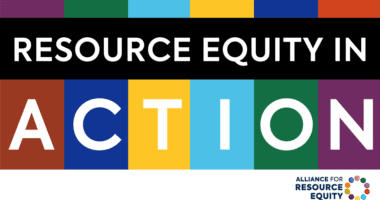Appreciating Teachers Beyond Teacher Appreciation Week
It’s Teacher Appreciation Week, and social media and teachers’ desks are filling up with expressions of gratitude for the extraordinarily important work that teachers do. Truly appreciating teachers, though, requires more than a once-a-year acknowledgement. Appreciating educators means ensuring support for them to develop and sustain their work to help students learn, especially those students for whom society too often has low expectations.
National statistics show that teachers in high-poverty schools are more likely to change schools (12 percent) or leave the profession (10 percent) than teachers in low-poverty schools. However, teachers in high-poverty schools are also significantly more likely to stay at their schools when they are satisfied with school leadership and staff cohesion.
My job at Ed Trust is to find, analyze, and interpret data like these that help us understand whether low-income students and students of color have access to strong, well-supported teachers. But often, it’s the personal stories from friends and family in education that teach me the most.
One such person is my friend “Vickie.” She’s an amazing early childhood educator with a focus on special education. Her students often start the year lacking both impulse control and pre-numeracy and pre-literacy skills, but finish it with the ability to self-regulate away from meltdowns and with solid early literacy and arithmetic skills. She attributes that to having an expert principal her second year teaching who guided and supported her in developing her classroom management skills.
When that principal retired, Vickie had administrators who — instead of offering feedback — ignored teachers who either sought support or offered suggestions for school improvement. By then Vickie had learned to teach effectively but saw progress stall for students in her novice colleagues’ classrooms. In a school where administrators expected each classroom to function in isolation, Vickie and her colleagues had no opportunities to collaborate and learn from each other. As a result, many — including Vickie — left for places where they could get support for their professional growth.
Vickie’s new school uses an inclusive model, new to her, in which students with and without disabilities are educated together, and classes are co-taught by a teacher and a clinician so collaboration is built into the school’s structure. It’s also far more affluent than her previous schools, and this is the first time in her teaching career that her students haven’t been mostly students of color. Her explicit goal is to “see how to do the school model right so I can bring it back to students like the ones I’ve been serving.”
To accomplish that goal, in a few years she’s likely to transfer to administration. While she loves kids and doesn’t want to leave the classroom, she also doesn’t want her impact to be limited to her own classroom. Without opportunities to lead in other ways, administration seems the next logical step in her career ladder.
If we really want to appreciate teachers, we must ensure that they have both the support and opportunities for growth that Vickie and her colleagues frequently lack. That means offering career pathways for excellent, experienced teachers so they have ways to advance that don’t require leaving the classroom. That means districts and principals only assigning students to teachers with the skills and subject and grade expertise to meet their needs. That means school leaders letting teachers know that everyone has room for growth and supporting teachers when they need it. That means making sure that teachers can trust that when their kids leave their classrooms, they’ll keep progressing in the classroom down the hall. And, while not enough on its own, appreciating teachers also means celebrating successes and saying, “Thank you,” as often as possible.





